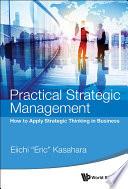Many theoretical as well as practical books on management theory analyze a range of subjects from strategic management to business strategy, competitive strategy, marketing management, strategic marketing, one-to-one marketing, consumer behaviorism, growth strategy, functional strategy, and technology management. In addition, there are also many how-to books on strategy formulation.But not many books on the topic are written with a step-by-step guide on making practical strategic management decisions. The author presents 15 steps that combine strategy and marketing aspects in business. The steps are presented systematically and holistically. Readers will be able to maintain the “big picture” perspective, while being able to dive deep into each step. The guide is not written for “ideal situations” in business. Much attention is given to being aware of market trends, business competition, and the limitations of resources, to be able to apply practical strategic thinking in business.
The steps are presented systematically and holistically. Readers will be able to maintain the “big picture” perspective, while being able to dive deep into each step. The guide is not written for “ideal situations” in business.










